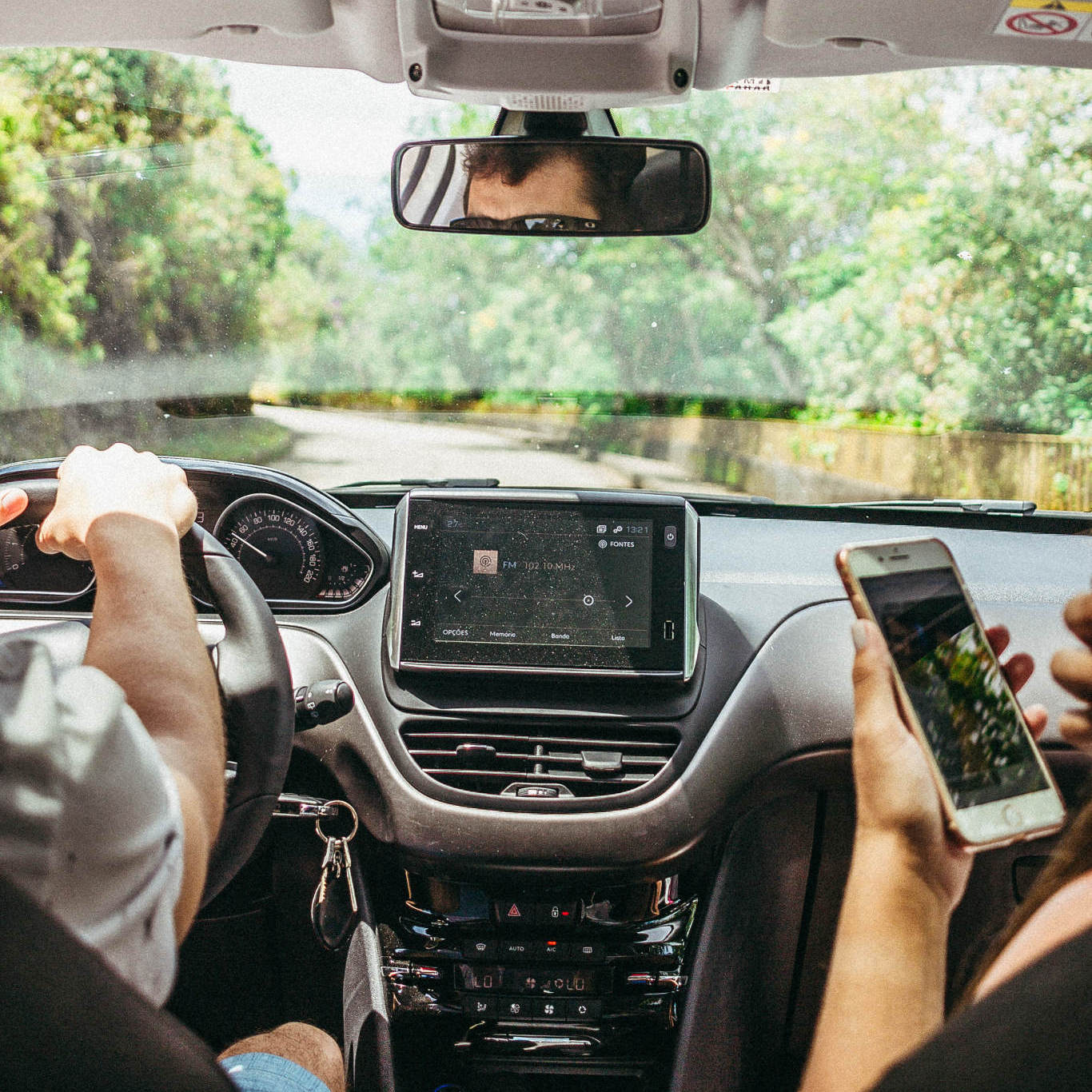Taking a road trip is the best way to turn your vacation into an adventure. You never know exactly what you’ll see or who you’ll meet as you visit new towns, take in natural wonders and build memories. Throw in the chance to avoid long airport lines, expensive add-on fees and stressful security checkpoints, and there’s no better way to travel.
But you want to make sure your road trip is the right kind of adventure — the kind where everyone has a good time, stays safe and comes home with happy memories. That takes a little extra planning up front.
Whether you’re planning a week-long trip with your family or just getting in the car with a good friend and driving, here are eight essential road trip tips.
-
Tip 1 Get Your Vehicle Inspected
A breakdown is the last thing you want to have happen on a long road trip. Not only will this derail your trip and be expensive to fix, it can also put you in real danger. Canada is famous for its wonderful, unspoiled wilderness, but that wilderness can put you far from help if you have car trouble. Don’t risk it.
Take your car in for inspection and routine maintenance. This should include:
Fluids: Your mechanic should check your oil and oil filter; brake, power steering and transmission fluid; radiator coolant; and windshield wiper fluid. Even if you’re not quite due for an oil change or new transmission fluid, it’s a good idea to get them replaced before a long trip.
Tires: Your tires should be checked for wear and air pressure. There’s a good chance you may need a tire rotation and/or suspension alignment before taking a road trip. Be sure your tires are suited for your whole trip. If you’re going to be up in the mountains or on unpaved roads, you may need all-weather tires or chains — even in the summer. Tire chain laws vary by province, so be sure to make sure they’re legal if you plan to use them.
Periodic Maintenance: If your car is nearing the maximum life of an engine belt, or it’s been a while since you’ve changed the filter or brake pads, it’s a good idea to perform the needed maintenance before your road trip.
You should also take care of any minor repair or replacement needs, such as burned out bulbs or cracked headlight housings. And don’t forget your battery — particularly if your plans include camping out away from the city lights.
Inspection: Get a complete vehicle inspection and tell your mechanic about any strange sounds or behaviors you’ve noticed recently.
If you’ve been worrying about that rattling sound when your car starts, or that strange little lurch it always does around 50 km/h, make sure they know so they can find the source of the problem.
-
Tip 2 Plan Your Trip Out With Everyone
Picture this: you tell your family you’re taking a road trip from Toronto to Nova Scotia. Everyone is excited. With two weeks off, you’ve got time for sightseeing, side excursions and just relaxing by the ocean. But a few hours into the trip, you realize your family all have very different expectations.
You want to take some side trips — perhaps head up to Algonquin Park for a day or two in the wilderness, or cross the border into New York. Your spouse thought you were going to go straight there to spend more time relaxing on the coast.
Your teenage daughter wants to stop in Montreal and spend a day exploring, preferably on her own. And your toddler just wants to know what all kids want to know: “Are we there yet?”
Everyone has a different approach to road trips, and sometimes approaches don’t meet. If your spouse likes to plan out every step of the trip and you like to be spontaneous, or your younger child loves winding roads, but your older one gets car sick easily, there’s likely to be conflict.
The best way to ensure that everyone has a good time on your long road trip is to plan it out together. You don’t need to agree ahead of time on every detail, but you should decide on the basics. Talk about what places you want to see, how long everyone is comfortable spending in the car and how long you’re spending in each place.
Try having each family member research a few things they want to do along the way. This will get your family members excited and ensure that there are backup options if someone’s perfect side trip or night out isn’t feasible.
-
Tip 3 Be Prepared for Emergencies (Like an Accident)
No one likes to worry about worst case scenarios, but it’s better to spend an hour planning ahead of time than to wish you had. Take the time to prepare for medical emergencies, breakdowns, accidents and other incidents.
For medical emergencies, take along a basic first aid kit. The Canadian Red Cross has a good list of recommendations. In addition to basic health care and survival supplies (gauze, antiseptics, thermal blanket etc.) they recommend you keep emergency information with your kit.
Printing out the phone numbers of friends, family and other contacts, along with any local emergency numbers you might need is an excellent idea.
Don’t forget car emergency supplies either. Make sure your jack and spare tire are in good operating order, and ensure that you have flares, a flashlight and other supplies in case of a breakdown.
You should also double-check your glovebox to make sure all necessary documents are in order, should you have a crash or get pulled over by the police. If you’re going across the border, make sure that your insurance is valid in the United States, and verify exactly what it covers. Your insurance will probably cover you, but it may not be as extensive, posing additional liability.
Finally, consider all the risks that may be unique to your group or your trip. Make sure that everyone has all of their needed medication — and make sure that everyone in your group is aware of any conditions someone might have. If your travel partner has a bee sting allergy that requires epinephrine, it’s a lot better to know ahead of time than try to figure out after they’ve been stung!
-
Tip 4 Be Prepared to Keep Your Kids Entertained
Gazing at the majestic scenery might be your idea of a perfect drive, but that doesn’t mean it’s enough to keep your kids entertained. You’ll all be happier if they have a way to stay busy during the long drive.
If your kids are going to be entertaining themselves on portable game systems or tablets, make sure you’re able to provide power. Bring extra USB cables if your car has outlets. If it doesn’t, consider getting an alternate source of power, such as an external power pack or a plug-in USB converter. An extra set of headphones isn’t a bad idea either.
You might also want to bring some travel games for your children to enjoy in the car. With traditional board games, it’s easy to lose the pieces in the car, but magnetic travel games stay together, even in start-and-stop driving.
If you have the room for it, you may want to bring some blankets and pillows the kids can use in the car. For infants and young child, think about what items they need to stay calm and happy. Taking an extra five minutes to make sure your 5-year-old has their favorite stuffed animal is a worthwhile investment in a happy and meltdown-free trip!
-
Tip 5 Make Allowances for Rest and Delays
Sometimes, kids are a joy to travel with. They sleep through the trip, or gaze excitedly out the window, taking in the sights and sounds. But at other times, well, not so much. Young children might need to make frequent bathroom stops, or get car sick. They can get stressed out and pick arguments, or just be too tired and restless to drive any further.
Make sure you leave extra time when you’re planning a road trip. If you plan long drives every day and reservations every night, you have no choice but to push on. But if you plan a shorter trip, you have time for any unexpected delays (or timeouts).
Don’t forget to leave rest days and free time. On a long road trip, your kids will need some time to sleep in, run around and burn off energy, or just relax and read for a few hours. If you’re a two-parent family, you can use your own preferences to give your kids (and yourselves) more options to unwind. The parent who wants to go and explore can take the adventurers out on the town, while the rest of the gang can lay around and watch a movie for the afternoon.
-
Tip 6 Bring Plenty of Food
Going out to eat is one of the joys of a road trip, but on a long drive, sometimes there aren’t a lot of options. If you’re trying to make an eight-hour drive, you’re probably going to want to eat on the go, not hunt down the local diner in whatever town you’re passing through.
If you don’t pack well, that’s going to mean way too much fast food and gas station snacks. Bringing plenty to eat and drink will help you eat healthier, feel better and save money on the road.
Start with some non-perishable snacks, like trail mix, nuts and dried fruits. Then, add in a cooler with some cold drinks and fresh fruit. Pack a few sandwiches, some leftovers or a favorite dish from the deli, and you’re all set for a long drive!
Don’t forget to plan for nights when you really feel like staying in. Having a few packs of instant noodles, chili or PB&J on hand lets you rest up in your room after a long drive, without worrying about where to find food.
-
Tip 7 Pack for Everything You’re Traveling Through
When you’re packing for a long road trip, it’s natural to focus on the destination. But the tee shirt, shorts and sun hat you brought for the beach aren’t going to be a lot of help while you’re driving through the mountains to get there. Make sure you pack for the whole trip, not just the destination.
Don’t forget about park passes, ticket printouts and any other paperwork you might need on the way. Most of us buy tickets on our phones when we need them, but that’s not always a good plan for vacations.
Parks and other destinations may require advanced ticket purchases, and your phone may not work when you’re way out in the country. You’re better off planning ahead of time, and bringing a paper printout of any reservations just in case. Stop by Parks Canada for permits and other information for planning your road trip.
-
Tip 8 Check in With Friends and Family
Letting people know where you’re traveling is a good idea for any road trip, but it’s especially important on long trips. If all they know is that you’ll be back in two weeks, they won’t know if you’ve been stranded in the middle of nowhere, or had some other misfortune befall you.
A brief text every night or two will keep your friends from worrying when unnecessarily, while ensuring they can send help if something does go wrong.
Tips for Planning Any Road Trip

Tips for Road Trips With Infants and Young Children

Tips for Planning a Long Road Trip

Enjoy Your Adventure!
A road trip is a wonderful opportunity to break out of your routine, see new people and places and build lasting memories. But like anything else, traveling on the open road has a few risks.
Whether you’re taking a romantic trip with your partner, a family excursion or a solo journey, take some time to plan and prepare, so you can have carefree, happy and safe road trip.
